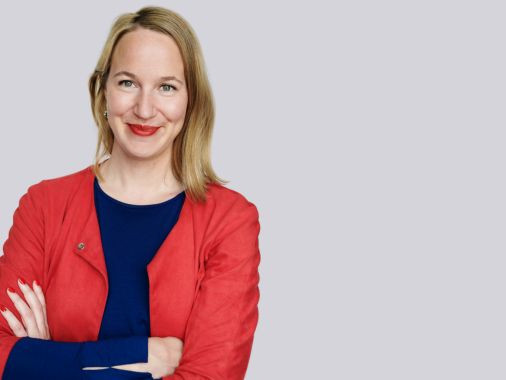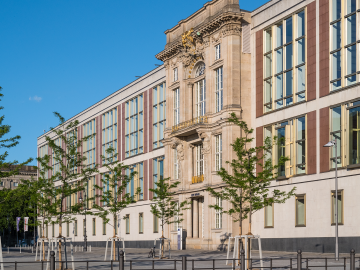Women’s Leadership Excellence: Empowering women in leadership

Last year, Olga completed the Women’s Leadership Excellence (WLE) program, and we caught up with her to learn about her experience.
Why did you enroll in the program?
A colleague of mine encouraged me to participate in the Women’s Leadership Excellence program when I started working at ESMT two years ago. I did not immediately take her up on the suggestion, as I had just completed my Executive MBA and felt I should first “digest” all that learning. However, my colleague continued gently nudging me, so I enrolled last year, and I am glad I did!
I must admit, I was initially skeptical of leadership programs specifically tailored toward women. But over the years, both in my professional life and while doing the MBA, I did notice differences between the assertiveness of men and women and their approach towards strategic networking. The WLE program addresses these aspects through academic input, practical exercises, and peer coaching.
How has the program improved your goal alignment and contributions to your organization?
For me, the program was about being conscious of the importance of figuring out your goals and how they relate to your organization’s goals. It improved my ability to clearly articulate how I can contribute to my organization’s goals. It also heightened my ability to identify individuals outside of my own organization with whom I can actively collaborate to achieve shared goals.
Have you been able to maximize your impact as a female leader through the strategies learned in this program?
Before the program starts, you are asked to collect structured feedback from different people you work with (anonymously), and to answer a few short questions on your network. You then get to work with this data throughout the program. For example, the survey of your network is fed back to you in the context of scientific findings on the role of strategic networks for career development.
That really gave me food for thought and provided specific pointers with regard to relationships to nurture. As a result of proactively approaching Prof Raji Jayamaran, I had the opportunity to contribute to the development of a new course on “Doing Business Sustainably” together with Raji and the fantastic team of the ESMT Learning Innovation Lab.
In terms of public speaking, the program gave me the confidence to seek out and accept more speaking engagements. For example, in the past two months, I’ve moderated a panel discussion on impact investing at ESMT Demo Day organized by ESMT’s entrepreneurship hub Vali Berlin. I also designed and facilitated a workshop on stakeholder management “the S in ESG” with the students from ESMT’s Net Impact chapter, and moderated an open lecture with Imme Scholz on where we stand on achieving the United Nations Sustainable Development Goals (SDGs).
What was your overall impression of the participants in this program?
I found the participants to be very diverse in terms of nationalities and professional backgrounds. There were more women with a technical background or working in finance and policy than I would have expected, and I found that valuable.
In my current role, I work on climate-related investments, so it was great to make new contacts outside my own bubble that can bring in new perspectives. The coaching day, where we worked in small groups of six, created an environment that made it easy to open up and share challenges and experiences along our leadership journey.
I’m actually meeting with one of my fellow participants next week to follow up on the conversations we had during the program last year. This is a follow-up that we’ve set up among ourselves, but as an alumna of the WLE you also get the opportunity to attend networking dinners of all subsequent cohorts. The program runs twice a year, so that is a great way to continue to expand your network over time.
What was the highlight of the program for you?
For me, the highlight of the program was the coaching day with Annie Faulkner. Participants of the WLE are split into groups of five for one day, working with a coach to map out career (and life!) goals and identify pathways to get there.
I found Annie’s coaching particularly helpful for two reasons. First, she has had a successful career in finance before starting to work as a coach and can thereby relate to what it means to build a path for yourself in a rather male-dominated environment. Second, Annie was skilled at transmitting her coaching skills throughout the day. She turned everyone in our group into a peer coach, reminding us to refrain from giving advice and instead guiding the coaches to come up with answers themselves through thoughtful questions.
I also really enjoyed the intensive work on public speaking with trainers from Dramatic Resources, who all come from the theater. They shared techniques from improv comedy. Unlike other public speaking training I had attended previously, this training placed a lot of focus on getting into the right mindset, which I found very valuable.
What key takeaways or lessons have you learned from this program that you believe will have a lasting impact on your leadership journey?
If I had to sum it up in one word, that would be intentionality. I’m more intentional about what I want to achieve, if I am in the right place for doing so, and in identifying people inside and outside my organization who are passionate about the same things that I am, or who bring in a perspective that I don’t have. I’m also more intentional about what brings me energy and who I can bring out the energy in others to make progress on issues I care about deeply.
